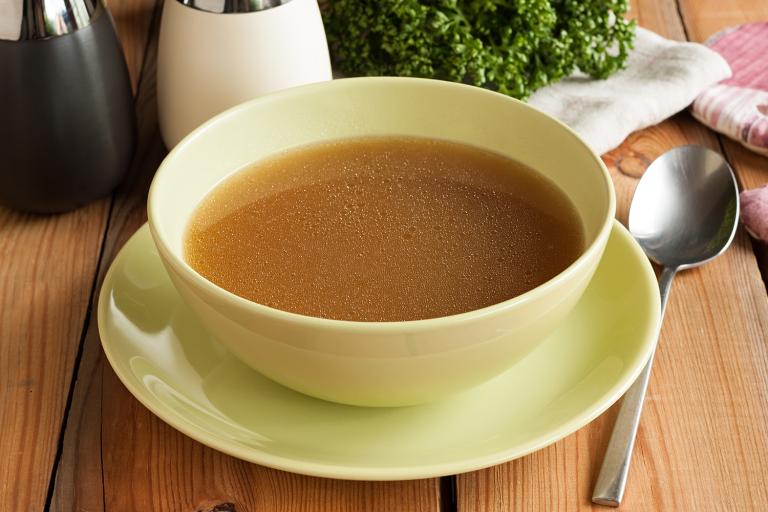In today’s world, where everything really, really old is chic again, Paleo enthusiasts don't need to spend hours upon hours simmering bones to make bone broth. They can get their winter brew much more easily—by purchasing it.
Your Ancestors Should Know
There are many examples of people throughout history making hearty broths from boiling bones with assorted meat and vegetable scraps.
Broths have long been essential in Asian cooking—and prescribed in Chinese medicine. Mexicans still eat a stew called pozole that dates to pre-Columbian days. And then, of course, there’s your grandmother’s chicken soup—doled out to battle coughs, sneezes, and fevers.
Long seen as warming and comforting, bone broth—soup made by simmering animal and fish bones, and specifically cartilage, with other ingredients for hours—is hot in more ways than one these days. Sally Fallon Morell and Kaayla T. Daniel, authors of Nourishing Broth: An Old-Fashioned Remedy for the Modern World, tout the healing qualities of bone broth, mentioning conditions including cancer, arthritis, allergies, digestive diseases, and more. “Bone broth, rich in the elements of cartilage, collagen, and healing amino acids, can provide protection from these ailments, can serve as an important element in recovery, and can nourish and enrich our lives in many ways,” they write.
The Goods on Bone Broth
Jenny McGruther, author of The Nourished Kitchen and Broth & Stock, lists bone broth’s benefits on her Nourished Kitchen blog. It’s packed with protein. It’s potentially a source of amino acids including glycine, which supports digestion, and proline, which helps keep skin healthy when paired with vitamin C. The gelatin in bone broth, seen as a key flavor and health feature, also aids digestion, McGruther notes.
Morell and Daniel detail a number of benefits of bone broth in their book, including:
- Its nutrients are easy for the body to absorb.
- It contains glucosamine and chondroitin, which can prompt the growth of new collagen, repair joint damage, and lessen pain and inflammation.
- Its key ingredients—calcium, magnesium, collagen, and phosphorus—can help to grow and repair bones.
- Because the gelatin it contains can protect and repair the mucous lining of the digestive tract, it can help with gut and digestion issues.
- Its collagen and gelatin also support skin, nail, and hair growth.
- Thanks to the calming properties of glycine, it promotes sleep and settles the mind.
- It helps fight off colds and flu.
Another use? The Los Angeles Lakers use bone broth as a sports recovery drink.
Quick and Easy
There are a few ways to enjoy bone broth. If you live near a restaurant or market that sells high-quality broth, then by all means, partake! And if you are handy in the kitchen and able to keep a pot simmering for eight to 24 hours, you can easily find recipes online or in magazines and cookbooks.
One option for people with busy, on-the-go lives is to buy bone-broth powder. Some are made to be added to hot water, the way you would prepare bouillon from a cube, while others can be used like protein powder—stirred into shakes, fruit or vegetable smoothies, or juice.
When you buy bone broth powder, select a brand you respect and read the ingredients. Avoid those that are high in sodium or contain MSG, and look for the ingredients that give bone broth its benefits.
The Upshot
Bone broth is trendy these days, buoyed by endorsements from celebrities like retired LA Lakers basketball player Kobe Bryant. There’s plenty of anecdotal evidence supporting its benefits, and while its key ingredients have been repeatedly shown to offer nutritional value, no research has been published as yet on the benefits of bone broth itself.
It may not live up to its hype as a cure-all, some scientists have noted, but bone broth has a long-standing history as a comforting and healing food.
